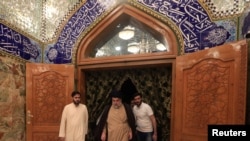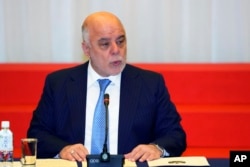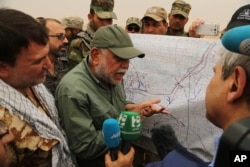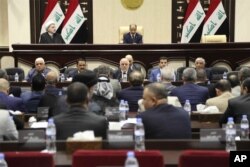Widespread disillusionment with Iraq's current political class appears to have helped the political coalition of influential Shi'ite cleric Muqtada al-Sadr become the early front-runner in national elections marked by record low turnout.
Partial returns of the 2018 vote — the first since Iraq declared victory over the Islamic State group — were announced late Sunday by the Iraqi electoral commission and put al-Sadr's political alliance in the lead in four provinces, including Baghdad.
The election came as the country deals with the disenfranchisement of the country's Sunni minority. Of more than 2 million Iraqis displaced by the war, the majority are Sunnis. Also at issue is the influence of Iran on the country: Iranian-backed Shiite militias who played a key role in defeating IS and were allied with the Shi'ite-led Baghdad government made significant electoral gains.
Al-Sadr is a strong Iraqi nationalist — he is critical of any outside influence in the country — and campaigned on a platform that criticized Iraq's current political leadership as deeply corrupt. He rose to prominence in Iraq after the 2003 U.S.-led overthrow of Saddam Hussein when he commanded a militia that fought American troops. He also commanded paramilitary forces in the war against IS.
Al-Sadr did not run for a seat in parliament and therefore cannot become prime minister. However, if his alliance wins the most seats, a member of his bloc will be tasked with forming a majority government and will appoint the country's next prime minister. Despite not holding an official office, al-Sadr exercises strong organizational control over his followers.
The election lacked a clear front-runner, but current Iraqi Prime Minister Haider al-Abadi was widely seen by analysts as the likely favorite. However, despite overseeing Iraq's military defeat of IS, al-Abadi is so far preforming poorly, coming in third and fourth place in most provinces, according to the partial results announced Sunday.
The electoral commission released results from 10 of the country's 19 provinces, including the provinces of Baghdad and Basra. The commission gave no indication on when further results would be announced.
The alliance currently in second place is made up of candidates linked to Iraq's powerful Shiite paramilitary groups, with close ties to Iran. The development is seen as an indication of Tehran's growing influence in Baghdad's halls of power.
The "Fatah" alliance — Arabic for conquest — is headed by Hadi al-Amiri, a former minister of transportation who lived in exile in Iran under Saddam. After the fall of Mosul in 2014 al-Amiri became a senior commander of paramilitary fighters in the fight against IS.
Unlike al-Sadr, who is staunchly against foreign intervention in Iraq of any kind, al-Amiri maintains close ties to Iran, praising the country's early support for Iraq in the IS war. He has also said that he is open to American training of Iraq's military and regularly meets with U.S. ambassadors to Baghdad.
Al-Sadr has repeatedly called for the full withdrawal of American troops from Iraqi soil.
Members of the national election commission read out vote tallies for each candidate list in each of the 10 provinces on national TV. By the end of the announcement, al-Sadr's list had the highest popular vote, followed by al-Amiri's.
Seats in parliament will be allocated proportionately to coalitions once all votes are counted.
Celebrations erupted in Baghdad's Sadr City, an impoverished quarter that is home to some 3 million people and is named after the cleric's late father, Ayatollah Mohammad Sadq al-Sadr. The younger al-Sadr campaigned on a cross-sectarian platform of fighting corruption and investing in services and struck a surprising alliance with the Communist Party in the capital.
While many did not turn out to vote amid a general mood of apathy, al-Sadr's sophisticated political machine mobilized his loyal base of followers to cast their ballots.
The elections held Saturday were the fourth since the 2003 U.S.-led toppling of Saddam Hussein. Officials said turnout was only 44 percent, the lowest ever since Saddam's ouster.
Any political party or alliance must gain a majority of Iraq's 329 seats in parliament to be able to choose a prime minister and form a government. Dozens of alliances ran for office in these elections and months of negotiations are expected before any one alliance can pull together the 165 required seats.
Until a new prime minister is chosen, al-Abadi will remain in office, retaining all his power.
Political power in Iraq is traditionally divided along sectarian lines among the offices of prime minister, president and parliament speaker. Since the first elections following the 2003 U.S.-led toppling of Saddam Hussein, the Shiite majority has held the position of prime minister, while the Kurds have held the presidency and the Sunnis have held the post of parliament speaker.
The constitution sets a quota for female representation, stating that no less than one-fourth of parliament members must be women. Nearly 2,600 women are running for office this year.







